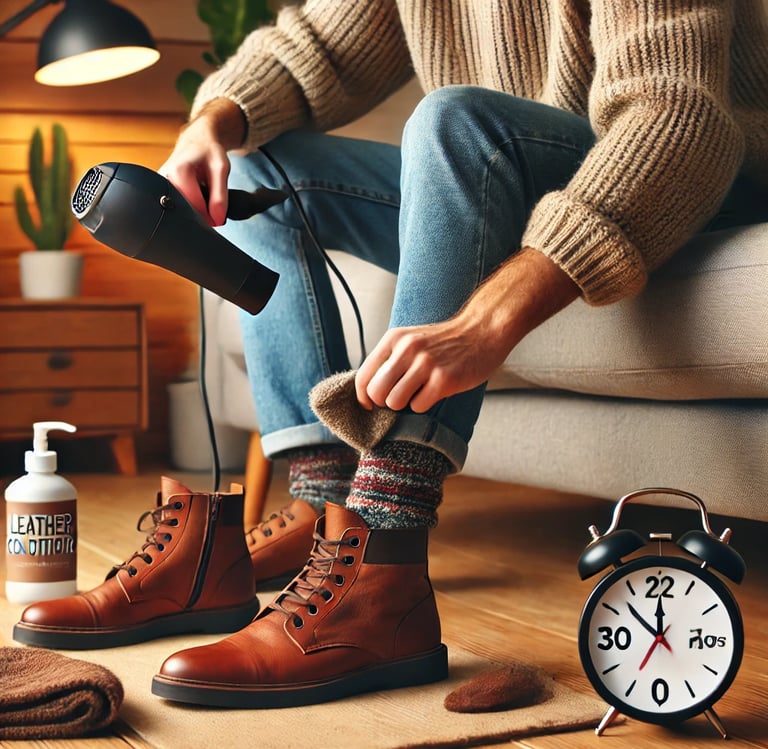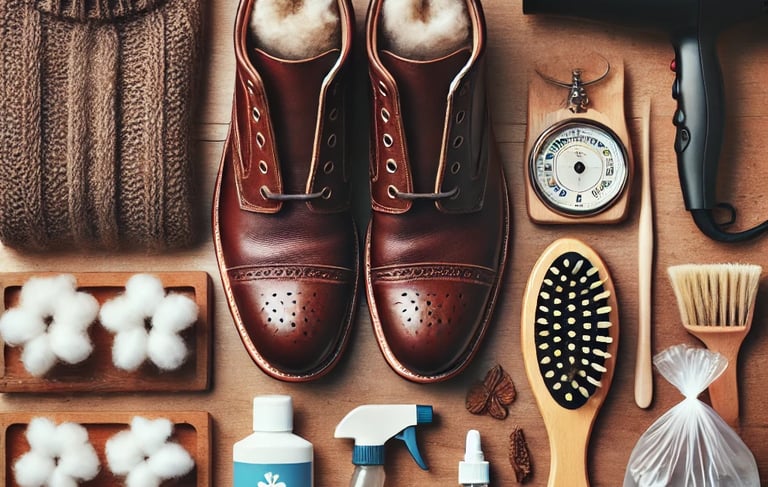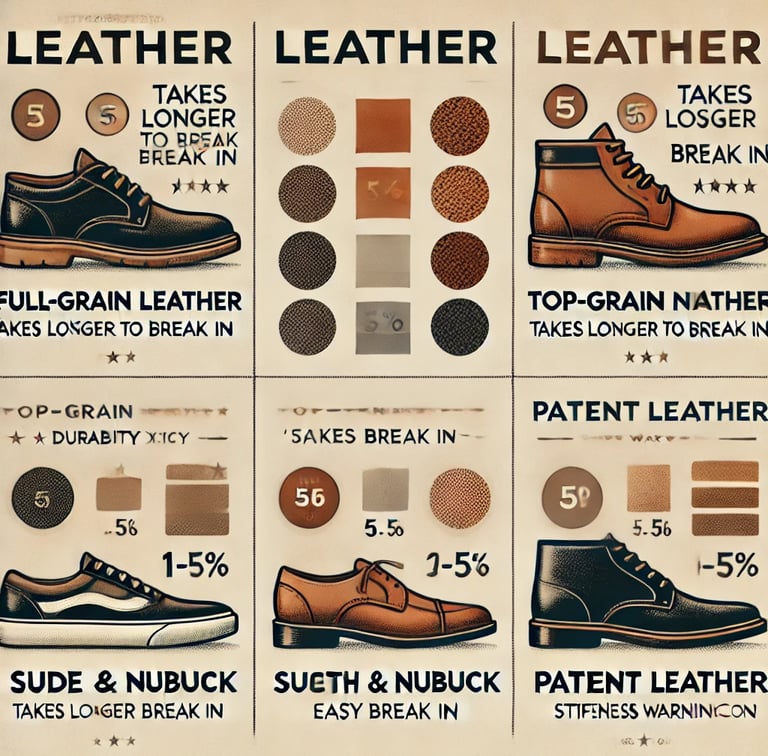How to Break in Leather Shoes Without Pain: 17 Easy & Effective Tips
How to break in leather shoes without the pain? Discover 17 expert-approved methods, DIY hacks, and products to make your new shoes comfortable faster.
7/9/2025


Why Breaking in Leather Shoes is Essential
Getting a new pair of leather shoes is always exciting—until you try walking in them for the first time. Leather, especially when new, can feel stiff, unforgiving, and downright painful. But don't worry—learning how to break in leather shoes the right way can save your feet from blisters, pinching, and discomfort.
Unlike synthetic materials, leather gradually molds to the shape of your foot. This natural transformation gives you a personalized fit—but only if you ease into it. In this guide, you’ll discover proven methods, DIY tips, and expert tricks to break in leather shoes comfortably, quickly, and safely.
Understanding the Leather: Different Types and Their Flexibility
Full-grain Leather vs. Top-grain Leather
Full-grain leather is the highest quality and toughest type, often used in premium shoes. It takes longer to break in but rewards you with long-lasting durability. Top-grain leather is smoother and more pliable, making it easier to wear in.
Suede and Nubuck Shoes
Softer by nature, suede and nubuck shoes typically require less breaking-in. However, they are more delicate and need extra care during the process.
Patent Leather: Stiff Yet Stylish
Patent leather, with its glossy finish, tends to be the stiffest. It’s less forgiving and more prone to causing blisters, so extra caution and gradual wear are key.
Preparation Before the Break-in Process
Choosing the Right Shoe Size
Before you even start breaking them in, ensure your leather shoes are the right size. Leather won’t stretch more than a half size, so getting the proper fit is essential.
Wear Socks: The First Shield
Thick socks add a protective barrier, cushion your feet, and help stretch the leather. They're your first line of defense during the break-in period.
Pre-Treatment with Leather Conditioner
Applying a leather conditioner softens the material, making it more flexible and less likely to crack. Use a soft cloth and gently massage it in before the first wear.
Top Methods to Break in Leather Shoes Quickly
The Thick Sock & Blow Dryer Trick
Put on thick socks and wear your shoes. Then, using a blow dryer on medium heat, apply warm air to tight spots while flexing your feet. The heat loosens the leather and helps it mold to your foot shape.
Use a Shoe Stretcher
A shoe stretcher is one of the safest tools to expand leather shoes gradually. You can target specific tight areas with adjustable pressure, making it ideal for bunions or toe pinches.
Apply Leather Softening Products
Products like mink oil or saddle soap are designed to soften tough leather. Apply them sparingly and allow them to absorb overnight.
Gradual Wear: The Old-School Yet Safe Method
Indoor Walking Routine
Start by wearing your shoes around the house. The controlled environment reduces the risk of outdoor damage and allows your feet to adjust without pressure.
30-Minute Intervals Strategy
Wear your shoes for short intervals daily, gradually increasing wear time by 10-15 minutes. Within a week, you’ll notice a significant difference in comfort.
DIY Hacks to Speed Up the Break-in Time
Freezer Ziplock Bag Water Hack
Fill ziplock bags with water, seal them tightly, and place them inside your shoes. Freeze overnight. As the water expands into ice, it gently stretches the leather.
Rubbing Alcohol & Cotton Ball Stretch
Dampen tight spots inside the shoe with rubbing alcohol using a cotton ball. Immediately wear the shoes with thick socks to stretch while the alcohol softens the leather.
Common Mistakes to Avoid While Breaking in Leather Shoes
Skipping the Conditioning Step
Dry leather cracks more easily and can injure your feet. Conditioning is not optional—it’s necessary.
Overdoing Heat or Water
Excess heat or moisture can warp the shoe’s shape or damage the finish. Always moderate these methods with care.
Signs Your Shoes Are Properly Broken In
Comfortable Toes and No Pinching
If your toes have space and your heel stays snug without rubbing, you’re good to go.
Leather Molding to Your Foot Shape
A well-broken-in shoe will subtly contour to your arch and sole, offering a near-custom fit.
How to Maintain Comfort After the Break-in Period
Use Shoe Trees
Shoe trees help retain the shoe’s shape and absorb moisture, keeping them comfortable between wears.
Regular Conditioning and Polishing
Keeping the leather nourished maintains its flexibility and appearance. Polish them after every few wears for shine and protection.
Best Products for Breaking in Leather Shoes
Recommended Leather Conditioners
Bickmore Bick 4 Leather Conditioner
Leather Honey Leather Conditioner
Trusted Shoe Stretchers on the Market
FootFitter Premium 2-Way Shoe Stretcher
KevenAnna Wooden Shoe Stretcher
FAQs About How to Break in Leather Shoes
1. How long does it take to break in leather shoes?
It usually takes 5–10 wears over a couple of weeks depending on the leather type and method used.
2. Can I wear leather shoes all day when new?
It’s not advisable. Start with short periods to avoid blisters and discomfort.
3. Are there any products to speed up the break-in process?
Yes, leather softeners, stretch sprays, and shoe stretchers work effectively.
4. Will wetting leather shoes help break them in?
Only with controlled methods like the freezer hack. Direct soaking can damage the leather.
5. Can I break in leather shoes by running in them?
No. High-impact activities can damage new leather and injure your feet.
6. Do custom orthotics help in breaking in shoes?
Yes, they add comfort and shape the shoe’s inner structure to your foot.
Conclusion: Comfort is Worth the Effort
Breaking in leather shoes might require a bit of patience, but the comfort and long-term benefits are more than worth it. With the right techniques, products, and a little time, you can enjoy your leather shoes without a single blister in sight. Remember, leather is a luxury material that rewards those who treat it well.



